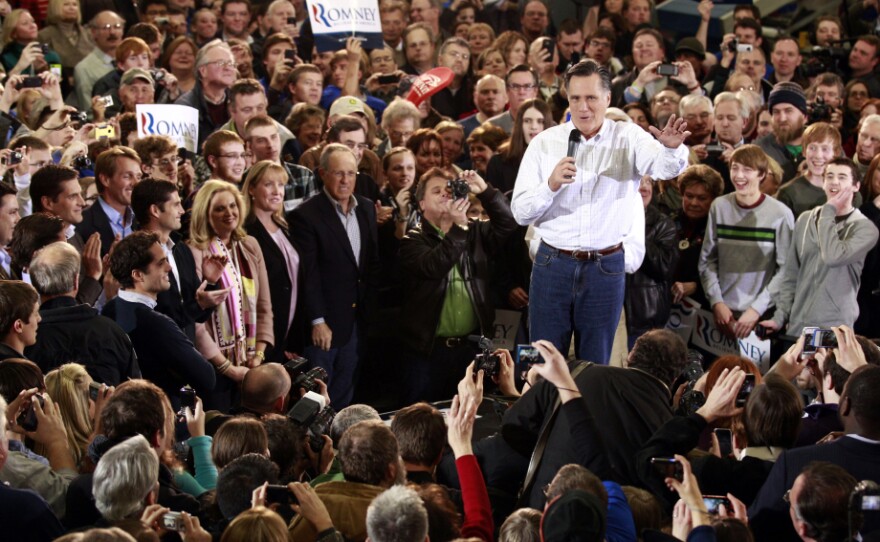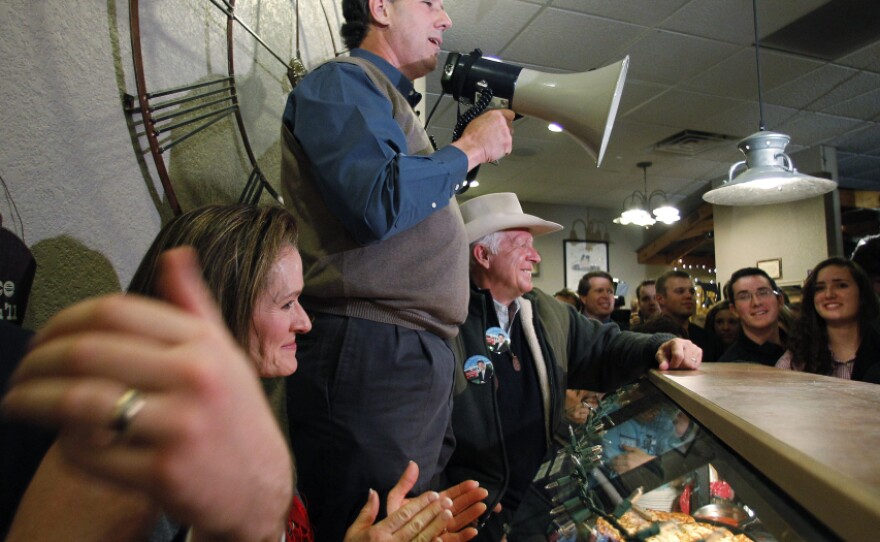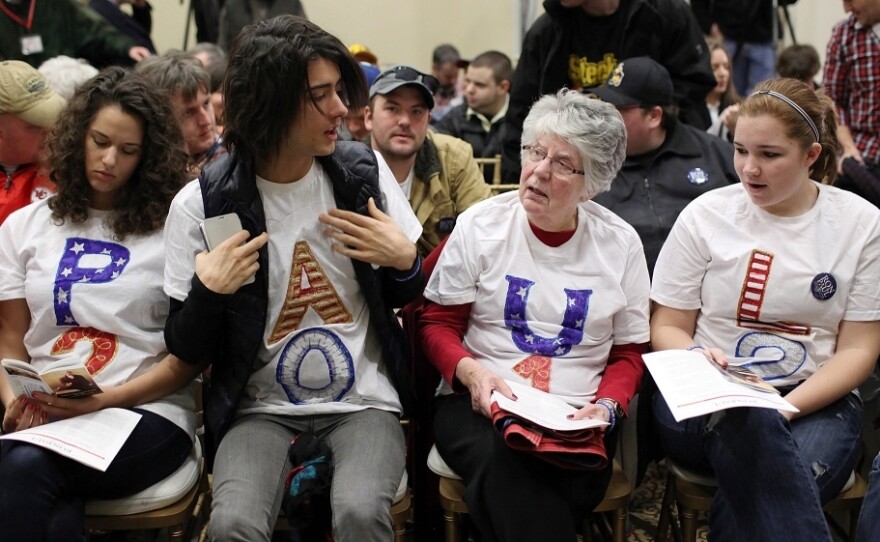Republican presidential candidates made a final push in Iowa hours ahead of Tuesday's first major test of the primary season, making last-minute whistle-stops in hopes of swaying many undecided caucus-goers.
Polls show the race in Iowa has narrowed to a three-man contest among former Massachusetts Gov. Mitt Romney, Texas Rep. Ron Paul and former Pennsylvania Sen. Rick Santorum.
Romney held a rally in the capital, Des Moines, while Santorum and Paul joined other candidates at a Rock the Caucus event for local high school students. Texas Gov. Rick Perry was preparing a final push, meeting early Tuesday with his volunteers and then holding two town hall-style meetings.

Indecision In Iowa
Iowa Republicans will cast their ballots beginning at 8 p.m. ET for the person they want to stand against President Obama in November. But after a bruising months-long campaign, more than a third of those participating in the caucuses say they still haven't made up their minds.
A Des Moines Register poll released Saturday found 41 percent of likely caucus-goers could be persuaded to change their minds, while another 7 percent had no first-choice candidate; 1 percent said they were not sure which candidate to support.
Although Romney began the week proclaiming, "We're going to win this thing," he was backpedaling on Tuesday. "It's hard to predict exactly what's going to happen. I think I'll be among the top group," he told MSNBC.
Romney also took the opportunity during the day to make a final dig aimed not at his Republican rivals, but at the president. "This has been a failed presidency," he told voters in a Des Moines ballroom. "I will go to work to get Americans back to work."
At the Rock the Caucus event in West Des Moines, Santorum appealed to students to think beyond their next job and toward long-term problems, such as the "exploding federal debt" that is "crushing the economy now and will crush your pocketbooks in the future."

"We're at a critical path. Who is the candidate who has a vision for America?" said Santorum, who has gained ground among conservative Christians who like his anti-abortion record and see Romney as too centrist.
Paul told the crowd that younger Americans were showing their support for him because he sticks to his principles.
"I endorse and defend the Constitution continually in Washington, and that appeals to young people," he said, also taking the opportunity to burnish his anti-war stance that has found fertile ground in Iowa. In the Des Moines Register poll, Paul was trailing Romney by just 2 percentage points.
Iowa Republican voters will gather for two-hour sessions in the living rooms of private homes, school auditoriums and libraries, where they will write the name of their favorite on blank pieces of paper. While only a small percentage of Iowans will attend the caucuses, the state vote holds outsize importance in the nominating process because it is the first test of the candidates' popularity and ability to organize.
Former House Speaker Newt Gingrich, who briefly looked like a front-runner, has seen his Iowa poll numbers plummet in the past few weeks as a series of negative ads sponsored by a pro-Romney political action committee began to take a toll.
On Monday, Gingrich even went so far as to predict his own defeat in the caucuses. But he had regained his patently pugnacious attitude a day later, calling out Romney, whose campaign has denied any association with the attack ads.
"This is a man whose staff created the PAC, and his millionaire friends fund the PAC," Gingrich said. "But he pretends he has nothing to do with the PAC. It's baloney. He's not telling the American public the truth."
Priority No. 1
Romney may withstand such challenges because many Iowa Republicans see him as the candidate most likely to defeat Obama.
At a Monday night rally in Davenport, voter Nancy Rudnick told NPR that she thought Romney "has the ability to turn this country around and to beat Obama." Asked which of the two was most important, she answered: "Beating Obama."
Like Gingrich, Minnesota Rep. Michele Bachmann also once led in Iowa and she, too, almost sounded as though she were conceding defeat during an appearance Monday.
At Tuesday's Rock the Caucus gathering, she said the key to her audience's future was to "open up the opportunities in the tax code, change our climate for business and open up the economy."
Perry, by contrast, seemed set for the long haul as he spoke to supporters Tuesday morning. The Texas governor compared the campaign to his 16-year courtship of his wife, Anita, saying that if it took that long to persuade her to marry him, then he's ready to spend months trying to "talk Americans into our vision."
Romney had largely stayed away from Iowa, thinking his chances weren't good, but made an 11th-hour push once it became clear that he had a chance of winning, campaign adviser Eric Fehrnstrom told NPR.
"I think we're surprised to find ourselves in the hunt here in Iowa," he said. "Back in the spring we didn't think that we'd do that well in Iowa, but based on what we've been seeing and hearing over the past several weeks, we decided to invest more time by the candidate here."
Looking Beyond Iowa
Fehrnstrom downplayed the importance of a single test that comes so early in the primary season, saying that the focus should remain on defeating Obama.
Iowa will send just a few dozen delegates out of the nearly 1,150 that will be needed by any candidate to wrap up the GOP nomination at the party's national convention this August in Tampa, Fla.
"There's a sense that even if Ron Paul or Rick Santorum takes first place in Iowa ... in the long term that's not necessarily a terrible thing for the Romney campaign," he said.
"I think whether we win or achieve something less in Iowa, we've built an organization that can go the long distance to Tampa," Fehrnstrom said.
After Tuesday's vote, Romney, Gingrich and Santorum planned to leave for New Hampshire. Romney holds a commanding lead in polls there and will be in a strong position to win the state's Jan. 10 primary even if he doesn't pull out a victory in Iowa. Paul plans to join his rivals in New Hampshire later in the week.
Perry and Bachmann don't plan to compete in New Hampshire, instead heading straight from Iowa to the first-in-the-South primary, set for Jan. 21 in South Carolina. Romney also plans to visit South Carolina this week.
NPR's Ari Shapiro, David Schaper, Don Gonyea and Ted Robbins reported from Iowa for this story, which contains material from The Associated Press.
Copyright 2022 NPR. To see more, visit https://www.npr.org. 9(MDAzMjM2NDYzMDEyMzc1Njk5NjAxNzY3OQ001))






